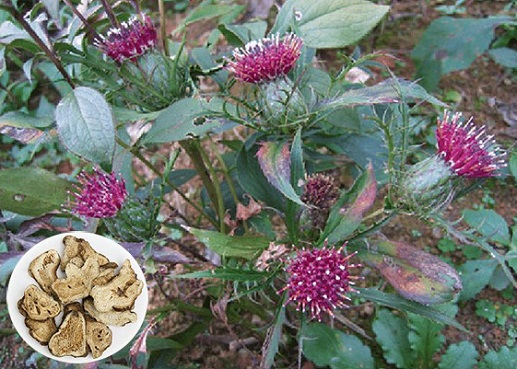Herbs And Phytochemicals: Atractylodes Macrocephala Koidz Offers Symptom Relief For IBS Through Ion Channel Modulation
Nikhil Prasad Fact checked by:Thailand Medical News Team May 31, 2024 1 year, 8 months, 2 weeks, 4 hours, 33 minutes ago
Herbs And Phytochemicals: Atractylodes macrocephala Koidz (AMK), a traditional herbal remedy, has long been valued in China, Japan, Korea, and Thailand for its health-promoting properties. Rooted in Traditional Chinese Medicine, AMK is known for its ability to strengthen the spleen and remove dampness, highlighting its holistic healing capabilities. Its diverse pharmacological activities, including anti-inflammatory, antioxidant, antibacterial, and anti-tumor effects, make it a versatile remedy. Among its many benefits, AMK is particularly notable for its positive impact on gastrointestinal (GI) functions, making it a potential candidate for addressing irritable bowel syndrome (IBS).
 Atractylodes Macrocephala Koidz Offers Symptom Relief For IBS Through Ion Channel Modulation
Understanding IBS: A Complex GI Disorder
Atractylodes Macrocephala Koidz Offers Symptom Relief For IBS Through Ion Channel Modulation
Understanding IBS: A Complex GI Disorder
IBS is a prevalent GI disorder characterized by symptoms such as abdominal pain, bloating, and altered bowel habits. Despite its high prevalence, the exact cause of IBS remains elusive, and current treatments primarily aim to alleviate symptoms rather than address underlying causes. The condition is believed to result from a combination of factors, including stress, gut dysbiosis, visceral hypersensitivity, and altered gut motility. Ion channels in the GI tract play a crucial role in regulating digestive processes, and their dysregulation can contribute to IBS symptoms.
The Study: Investigating AMK's Potential
In this
Herbs And Phytochemicals study, researchers from Pusan National University-Korea, Dong-Eui University-Korea, Korea Food Research Institute, Korea University of Science & Technology and Dongguk University-Korea explored the potential of AMK as a therapeutic agent for IBS using a zymosan-induced IBS animal model. Zymosan, a substance derived from yeast cell walls, induces colitis in mice, mimicking IBS symptoms in humans. The study aimed to assess AMK's effectiveness in alleviating these symptoms and to understand the underlying mechanisms, particularly focusing on ion channel modulation.
Network Pharmacology and Electrophysiological Experiments
The study employed network pharmacology to identify active compounds in AMK and their potential targets. Additionally, electrophysiological experiments were conducted to investigate AMK's effects on ion channels related to IBS. The zymosan-induced IBS model involved administering zymosan to the colon of mice, followed by treatment with AMK extract. Positive controls, including amitriptyline (an antidepressant) and sulfasalazine (an anti-inflammatory drug), were used for comparison.
Results: AMK's Impact on IBS Symptoms and Ion Channels
-Active Compounds and Gene Interaction
Using the Traditional Chinese Medicine Systems Pharmacology (TCMSP) database, researchers identified 55 potential active compounds in AMK, with 18 meeting the absorption, distribution, metabolism, and excretion (ADME) criteria. Further analysis re
vealed that 35 of these compounds were related to GI diseases, and eight genes were common between IBS-related genes and AMK target genes. Tumor necrosis factor (TNF) and sodium voltage-gated channel alpha subunit 5 (SCN5A) were notably associated with IBS.
-Alleviating Colonic Changes and Inflammation
In the zymosan-induced IBS model, AMK extract effectively normalized colonic changes, such as reducing the shortened colon length and increased colon weight caused by colitis. Stool conditions also improved significantly. Histological analysis showed that AMK reduced tissue thickness and inflammation, as indicated by decreased TNF-α expression levels.
-Pain-Related Behaviors and Weight Management
AMK extract notably reduced pain-related behaviors in the mice, particularly in the early stages of treatment. Additionally, it prevented weight loss associated with zymosan-induced colitis, although it did not significantly impact food intake.
-Ion Channel Modulation
Electrophysiological recordings revealed that AMK extract inhibited transient receptor potential (TRP) V1 channels in a concentration-dependent manner, with significant effects observed at 200 and 500 μg/mL concentrations. However, AMK did not affect TRPV4 or TRPA1 channels. For sodium voltage-gated (NaV) channels, AMK extract significantly inhibited NaV1.5 and NaV1.7 currents, suggesting its role in reducing visceral hypersensitivity and improving GI motility.
The Therapeutic Promise of AMK
IBS is a multifactorial disorder with complex underlying mechanisms. Traditional medicines like AMK offer a multifaceted approach to symptom management. The study demonstrated that AMK's modulation of TRP and NaV channels plays a crucial role in its therapeutic effects. TRPV1 regulation by AMK suggests its potential in reducing inflammation and pain perception, making it a promising candidate for IBS treatment.
Future Directions
While this study provides valuable insights, further research is needed to fully understand the molecular mechanisms of AMK's effects. Clinical trials in humans are essential to confirm its efficacy and safety for IBS treatment. Optimizing AMK's use in traditional medicine could provide effective relief and improve the quality of life for individuals struggling with IBS.
Conclusion: AMK as a Promising IBS Treatment
This study highlights the potential of Atractylodes macrocephala Koidz as a multifaceted therapeutic candidate for IBS management. Its ability to regulate ion channels, particularly NaV1.5, NaV1.7, and TRPV1, underscores its promise in addressing the diverse symptoms and underlying mechanisms of IBS. Further clinical research will be crucial in translating these findings into practical treatments, offering hope for improved management of this challenging GI disorder.
The study findings were published in the peer reviewed journal: Nutrients.
https://www.mdpi.com/2072-6643/16/11/1683
For the latest on
Herbs And Phytochemicals, keep on logging to Thailand Medical News.
Read Also:
https://www.thailandmedical.news/news/covid-19-news-greek-study-warns-that-sars-cov-2-infections-can-lead-to-development-of-irritable-bowel-syndrome-in-post-covid-phase
https://www.thailandmedical.news/news/meta-study-finds-astonishing-12-percent-incidence-rate-of-irritable-bowel-syndrome-ibs-among-post-covid-individuals
https://www.thailandmedical.news/news/harvard-and-mayo-researchers-say-a-large-number-of-individuals-will-end-up-with-irritable-bowel-syndrome-ibs-as-a-result-of-sars-cov-2-infections
https://www.thailandmedical.news/news/why-gut-infections-can-sometimes-lead-to-serious-chronic-conditions-like-ibs
